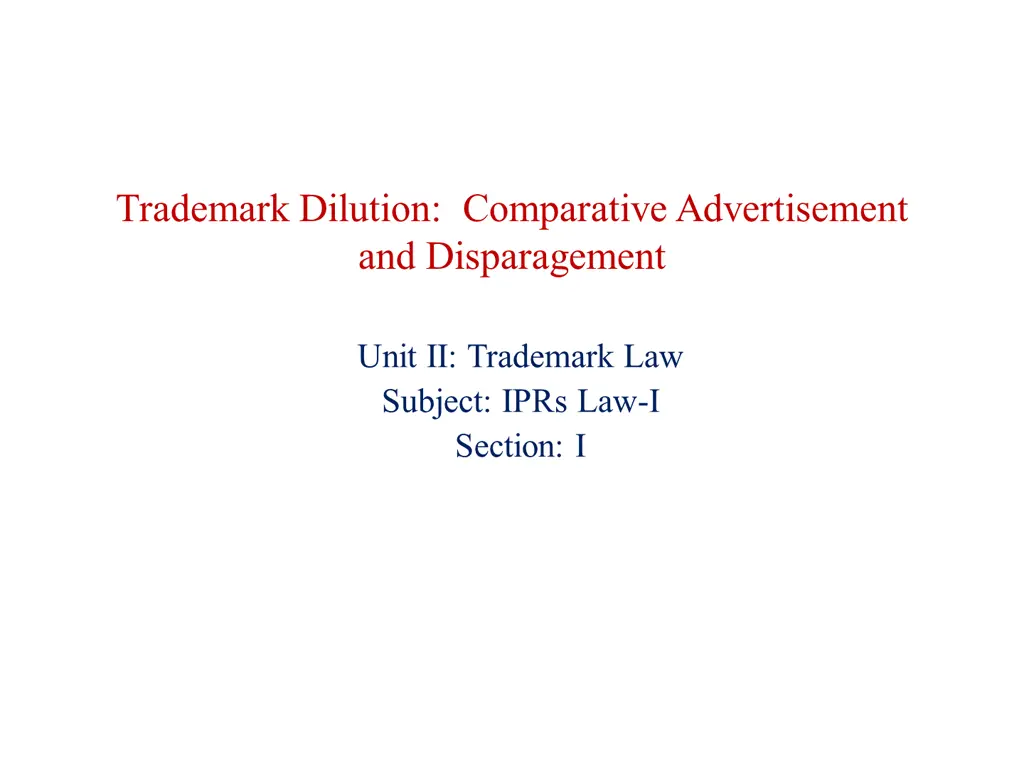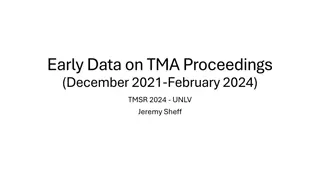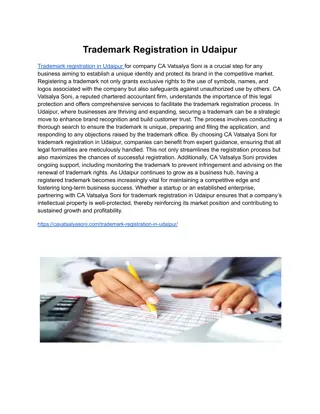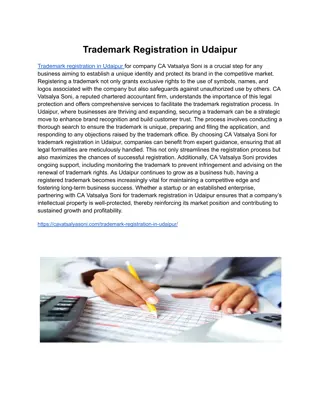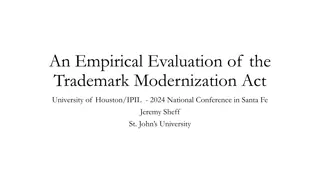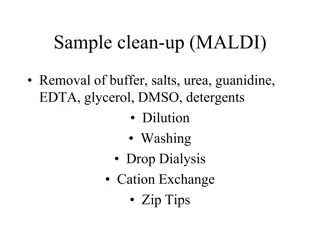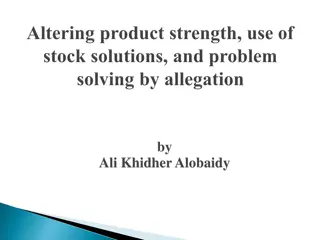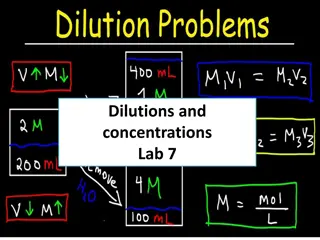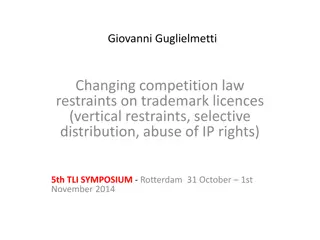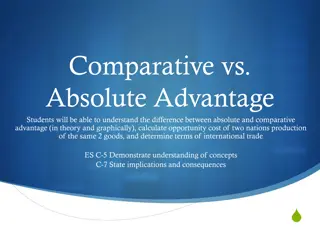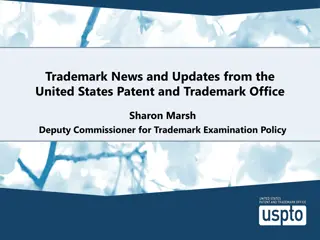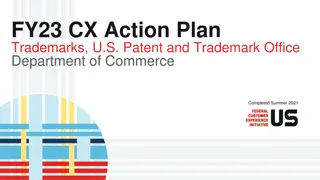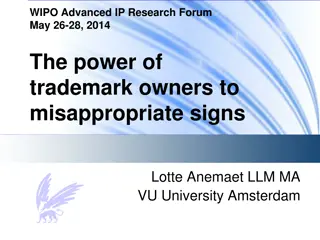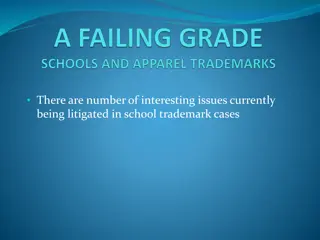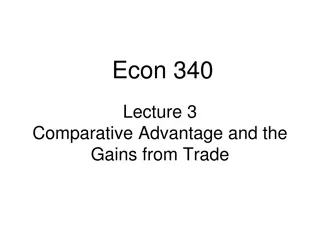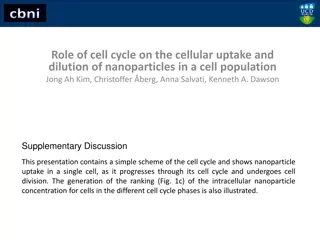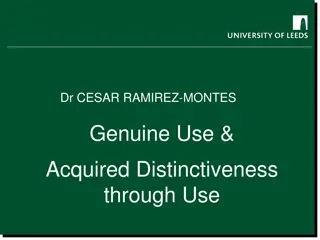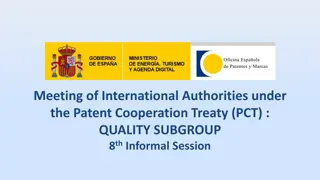Trademark Dilution and Comparative Advertisement
Trademark dilution and comparative advertisement in trademark law. Understand the grounds for trademark infringement and the elements needed to establish dilution or disparagement. Explore the importance of protecting registered trademarks and the limitations of comparative advertisement.
Download Presentation

Please find below an Image/Link to download the presentation.
The content on the website is provided AS IS for your information and personal use only. It may not be sold, licensed, or shared on other websites without obtaining consent from the author.If you encounter any issues during the download, it is possible that the publisher has removed the file from their server.
You are allowed to download the files provided on this website for personal or commercial use, subject to the condition that they are used lawfully. All files are the property of their respective owners.
The content on the website is provided AS IS for your information and personal use only. It may not be sold, licensed, or shared on other websites without obtaining consent from the author.
E N D
Presentation Transcript
Trademark Dilution: Comparative Advertisement and Disparagement Unit II: Trademark Law Subject: IPRs Law-I Section: I
Trademark Dilution The TM Act has the grounds on which trademark infringement can be claimed, such as likelihood of confusion, likelihood of dilution or disparagement of a registered trademark, and comparative advertisement. Dilution is a kind of violation of the trademark law relating to good and services, in which the defendant s use while not causing a likelihood of confusion, blurs distinctiveness or tarnishes the image of the plaintiff's mark. Therefore, it comes in to two forms: like Mixed Cola in Coke shaped bottles could be term termed Blurring ; and Coca Cola Whiskey labeled on Coke shaped bottles could be Tarnishment. Such action of dilutions could be held as commercial invasion. No unauthorized person could be allowed to commit such invasion or trespass on the marks or goods under Trademark Law. It could have the effect of diminishing or weakening the strength and identification value of the trade mark. Hence, Section 29 (4) could come for the help to registered trade mark. A registered trademark is infringed by a person who, not being a registered proprietor or a person using by way of permitted use, uses in the course of trade, a mark which:- a) is identical with or similar to the registered trade marks; and b) is used in relation to goods or services which are not similar to those for which the trademark is registered; and c) the registered trade mark has a reputation in India and the use of the mark without due cause take unfair advantage of, or is detrimental to, the distinctive character or repute of the registered trade mark. To get the protection against the dilution, the above given elements in the section 29(4) have to be established before the courts. There is no presumption of infringement involved with dilution of the marks. The test for recognizing the dilution has been established in the landmark case ITC Limited Vs. Phillip Morris (2010, (42) PTC 572): There must be a near identification of the two marks or they must have the closest similarity. For more detail refer this case. An important case may also be referred from Case Material: N. Ranga Rao & Sons Vs. Anil Garg (2006 (32) PTC 15). Wherein it was held that defendant s packaging is identical or deceptively similar to that of the plaintiff and the defendants have tried to dilute the marks and pass off as that of the plaintiff's goods.
Comparative Advertisement Comparative Advertising can be defined as advertising that compares one product or service with another or that states that one product works with or is compatible with another. Trademarks Act, 1999 has provisions related to comparative advertisement of goods and services under Ss. 29 (6), (7), (8) and 30(1). TrademarkAct, 1999 permits advertising under Sec. 30(1) which reads as: Nothing in section 29 shall be preventing the use of registered trademark by any person with the purposes of identifying goods or services as those of the proprietor provided the use:- (a)is in accordance with the honest practices in industrial or commercial matters, and (b)is not such as to take unfair advantage of or be detrimental to the distinctive character or repute of the trade mark. But, it has certain limitations as infringement of registered trademark under Sec. 29(8) which reads as: A registered trademark is infringed by any advertising of that trademark if such advertising: (a) takes unfair advantage and is contrary to honest practices in industrial or commercial matters; or (b) is detrimental to its distinctive character; or(c) is against the reputation of the trademark. In order to satisfy the test of comparative advertisement, the plaintiff has to establish the following key elements: i. Afalse or misleading statement of fact has been made about his product; ii. That the statement is deceiving or has potential to deceive, the substantial segment of prospective consumers; and iii. The deception is likely to influence consumer's purchasing decisions. The court will also take into account, the intent of the advertisement, its manner and the effect of the telecast of such a television commercial. The false, misleading, unfair or deceiving advertising is not protected as freedom of commercial speech, hence manner and intent of the commercial is important.
Contd.. Refer the case also given in Case Material: Pepsi Co. Inc. v. Hindustan Coca Cola Ltd. 305); Wherein it has been observed that it is now a settled law that mere puffing of goods is not actionable. Tradesman can say his goods are best or better. But, by comparison the tradesman cannot slander nor defame the goods of the competitor nor can call it bad or inferior. (2003 (27) PTC Reckitt & Colman of India Ltd. v. Kiwi T.T.K. Ltd, (1999 (16) PTC 393) Wherein the advertisement was regarded as comparative advertisement and five principles laid down by the Court to decide as to whether a party is entitled to an injunction were as under:- 1. untrue. A tradesman is entitled to declare his goods to be best in the words, even though the declaration is 2. He can also say that my goods are better than his competitors, even though such statement is untrue. 3. competitors', he can even compare the advantages of his goods over the goods of others. For the purpose of saying that his goods are the best in the world or his goods are better than his 4. goods are bad. If he says so, he really slanders the goods of his competitors. In other words he defames his competitors and their goods, which is not permissible. He, however, cannot while saying his goods are better than his competitors', say that his competitors' 5. If there is no defamation to the goods or to the manufacturer of such goods no action lies, but if there is such defamation an action lies and if an action lies for recovery of damages for defamation, then the Court is also competent to grant an order of injunction restraining repetition of such defamation. Refer these cases also: Reckitt & Colman of India Ltd. Vs. M.P Ramchandran (1999 (16) PTC 741); AnnamalayarAgencies Vs. VVS & Sons Pvt. Ltd. (2008 (38) PTC, 37).
Disparagement As per Webster's Comprehensive Dictionary, Disparagement means, to speak of slightingly, undervalue, to bring discredit or dishonor upon, the act of depreciating, derogation, a condition of low estimation or valuation, a reproach, disgrace, an unjust classing or comparison with that which is of less worth, and degradation. The Concise Oxford Dictionary defines disparage as under, to bring dis-credit on, slightingly of and depreciate. In legal sense, disparagement is a false and injurious statement that discredits or detracts from the reputation of another s property, product or business. In the electronic media, the disparaging message is conveyed to the viewer by repeatedly showing the commercial everyday thereby ensuring that the viewer s get clear message as the said commercial leaves an indelible impression in their mind. Trademarks Act, 1999 has provisions related to comparative advertisement of goods and services under Ss. 29 (6), (7), (8) and 30(1). To decide the question of disparagement; we have to keep the following factors in mind namely: 1) Intent of commercial; 2) Manner of the commercial 3) Story line of the commercial and the message sought to be conveyed by the commercial. If the manner is ridiculing or the condemning product of the competitor that it amounts to disparaging but if the manner is only to show one's product better or best without derogating other's product then that is not actionable. Mere puffing of goods is not actionable. Tradesman can say his goods are best or better .But by comparison the tradesman cannot slander nor defame the goods of the competitor nor can call it bad or inferior. Refer the case given in Case Material: Dabur India Ltd. Vs. Colgate Palmolive India Ltd. (AIR 2005 DEL 102) when the Defendant is propagating in the advertisement that there should be no consumption of Chayawanprash during the summer months, it is also propagating that the Plaintiff's Chayawanprash should not also be taken during the summer months as it is not good for health and instead Amritprash, which is the Defendant's product, should be taken. Such an advertisement is clearly disparaging to the product of the Plaintiff as there is an element of insinuation present in the said advertisement.
Contd.. The position of law in respect of disparaging advertisements of rival products is well settled. The said position of law is as under:- I. Atradesman is entitled to declare his goods to be best in the words even though the declaration is untrue. II. He can also say that my goods are better than his competitors, even though such statement is untrue. III. For the purpose of saying that his goods are the best in the world of his goods are better than his competitors he can even compare the advantages of his goods over the goods of the others. IV. He, however, cannot while saying his goods are better than his competitors, say that his competitors, goods are bad. V. If there is no defamation, to the goods or to the manufacturer of such goods no action lies, but if there is such defamation, an action lies and if an action lies for recovery of damages for defamation, then the court is also competent to grant an order of injunction restraining repetition of such defamation. Although, a tradesman is entitled to make an untrue declaration that his goods are the best, better than his competitors, and for that purpose can even compare the advantages of his goods over the goods of the others; he cannot say that his competitors' goods are bad. Further, such use generally/specifically of a proprietor's product for a comparison with the rival product of another proprietor violates the first proprietor's intellectual property rights. But, it a competitor makes the consumer aware of his mistaken impression, the Plaintiff cannot be heard to complain of such action. The vast majority of the viewer of the commercial advertisement on electronic media are influenced by the visual advertisements as these have a far reaching influence on the psyche of the people, therefore, discrediting the product of a competitor through commercial would amount to disparagement as has been held by the High Courts and the Supreme Court of India as well as the Law laid down by Courts in U.K. & U.S.A. The End!
